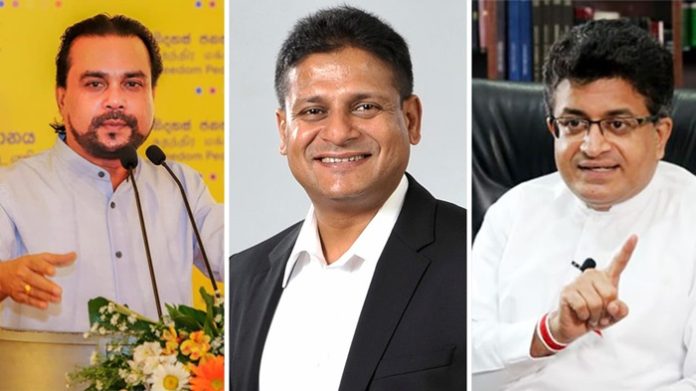In a significant development on the political landscape of Sri Lanka, several political parties and intellectual groups have united to form a new political movement named ‘Sarvajana Balaya’. The formal agreement to launch this movement was signed in Colombo this morning (27th May), marking the inception of a collaborative effort aimed at addressing the nation’s political and socio-economic challenges.
A Unified Front
The formation of ‘Sarvajana Balaya’ sees the convergence of a diverse array of political entities and thinkers. Leading the charge are prominent figures such as MP Wimal Weerawansa, the leader of the Jathika Nidahas Peramuna (JNP), MP Udaya Gammanpila, the head of Pivithuru Hela Urumaya (PHU), and entrepreneur Dilith Jayaweera, who leads the Mawbima Janatha Party (MJP). This coalition also includes the Democratic Left Front, the Communist Party, the Independent MP’s Forum, and several intellectual groups, signaling a broad-based alliance with a shared vision for the future of Sri Lanka.
Vision and Goals
‘Sarvajana Balaya’, which translates to “Power of the People”, aims to bring a new wave of political thought and action to Sri Lanka. The movement’s foundation rests on principles of inclusivity, socio-economic justice, and national development. By bringing together parties and groups from across the political spectrum, ‘Sarvajana Balaya’ aspires to create a platform that transcends traditional party politics, focusing instead on policies that benefit the broader population.
The leaders of this movement emphasize the importance of unity and collective action in addressing the pressing issues facing the nation. From economic reforms to social equity, ‘Sarvajana Balaya’ aims to propose and implement solutions that are both pragmatic and progressive.
Key Players
- Wimal Weerawansa (JNP): Known for his nationalist stance and vocal advocacy for economic independence, Weerawansa brings a wealth of political experience and a robust support base to the movement.
- Udaya Gammanpila (PHU): A key figure in the Sri Lankan political arena, Gammanpila is recognized for his legal acumen and dedication to preserving Sri Lankan heritage and culture.
- Dilith Jayaweera (MJP): As a successful entrepreneur and political leader, Jayaweera’s involvement underscores the movement’s commitment to innovative economic policies and development strategies.
Broad-Based Support
The involvement of the Democratic Left Front and the Communist Party highlights the movement’s appeal across different ideological spectrums, aiming to forge a common ground on critical national issues. Additionally, the participation of the Independent MP’s Forum and various intellectual groups ensures that the movement is not just politically inclusive but also rich in thought leadership and expert insights.
Challenges and Opportunities
While the formation of ‘Sarvajana Balaya’ is a promising step towards a more unified and effective political landscape, it also faces significant challenges. Navigating the complexities of coalition politics, maintaining cohesion among diverse groups, and translating their collective vision into actionable policies will require strategic leadership and sustained effort.
However, the movement also presents a unique opportunity to reshape Sri Lankan politics. By prioritizing the needs of the people and fostering a spirit of collaboration, ‘Sarvajana Balaya’ has the potential to drive meaningful change and restore public faith in the political process.
Conclusion
The launch of ‘Sarvajana Balaya’ marks a noteworthy milestone in Sri Lanka’s political journey. With seasoned leaders, a diverse coalition, and a clear vision for the future, the movement is poised to make a significant impact on the nation’s socio-political landscape. As it moves forward, the eyes of the nation will be on ‘Sarvajana Balaya’ to see how it navigates the challenges ahead and delivers on its promise of a better Sri Lanka for all.


